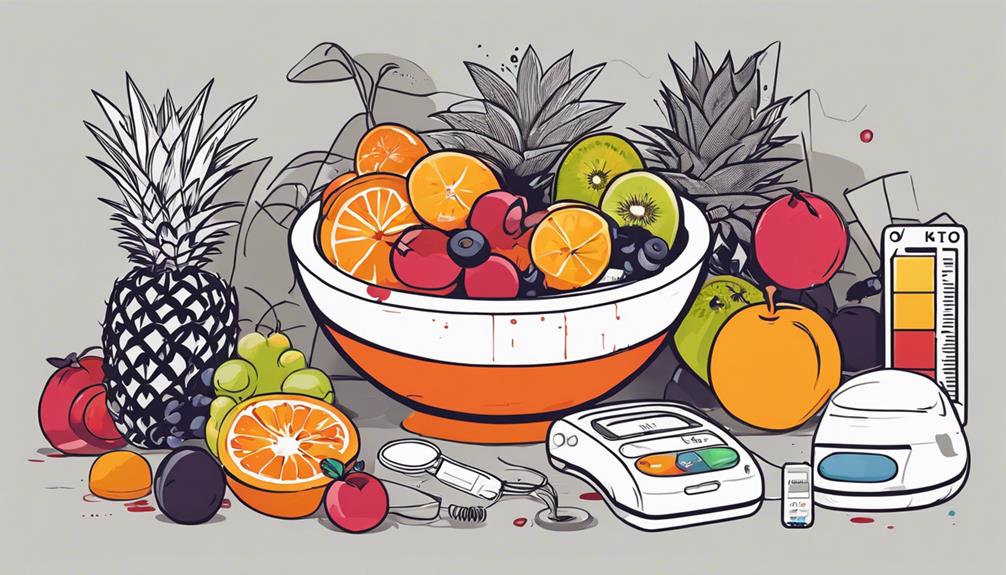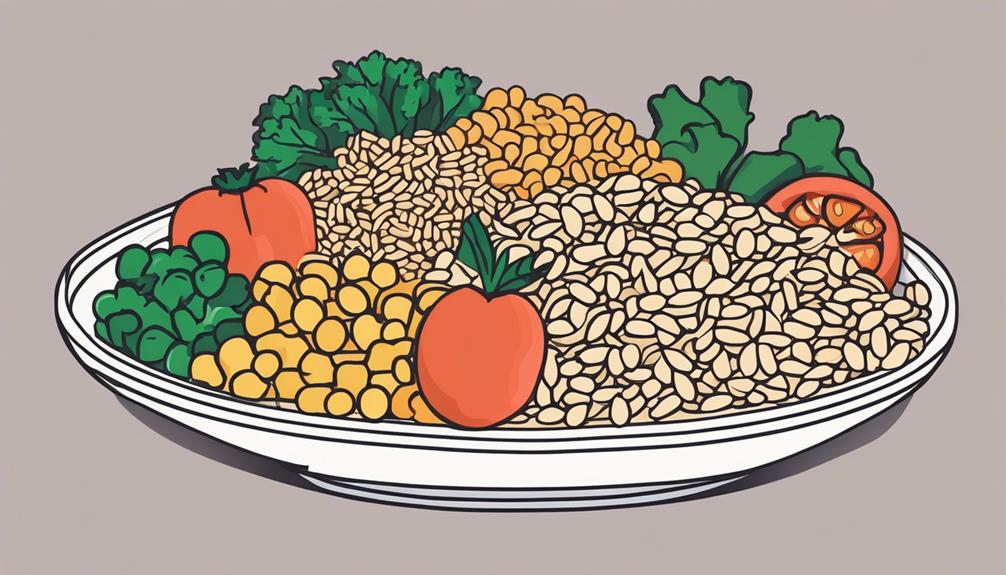Imagine your body as a well-oiled machine that requires the right fuel to run smoothly. Just like a car performs best with high-quality gasoline, managing diabetes demands a thoughtful selection of foods.
But what exactly are the best choices for a diabetes diet? Let's explore the key elements that can help you maintain stable blood sugar levels and overall health.
Key Takeaways
- Choose low glycemic fruits like berries and apples for better blood sugar control.
- Opt for lean proteins such as beans and tofu to manage diabetes effectively.
- Incorporate whole grains rich in fiber to promote satiety and glucose regulation.
- Include omega-3 rich foods like salmon or flaxseeds for heart health benefits in a diabetes diet.
Heart-Healthy Fruits for Diabetes Diet

When planning a diabetes diet, incorporating heart-healthy fruits is essential for managing blood sugar levels and promoting overall cardiovascular health. Opting for low glycemic fruits such as berries, cherries, and apples can help prevent rapid spikes in blood sugar. These fruits contain natural sugars that are released more slowly into the bloodstream, aiding in better blood sugar control. Portion control is key when consuming fruits, as even healthy fruits contain carbohydrates that can affect blood glucose levels.
Choosing fruits with a lower glycemic index can be beneficial for individuals with diabetes. For instance, berries like strawberries, blueberries, and raspberries have a lower glycemic index compared to fruits like watermelon or pineapple. This means they've a milder impact on blood sugar levels. Additionally, practicing portion control by measuring your fruit intake can assist in managing blood sugar levels effectively.
Lean Proteins for Diabetes Diet
Incorporating lean proteins into your diabetes diet is crucial for maintaining stable blood sugar levels and supporting overall health. When selecting proteins, opt for plant-based sources such as beans, lentils, tofu, and edamame. These plant-based proteins aren't only low in saturated fats but also high in fiber, which can help regulate blood sugar levels. Additionally, they contain various vitamins, minerals, and antioxidants beneficial for your health.
Low-fat dairy products like Greek yogurt, skim milk, and cottage cheese are excellent sources of lean protein for individuals with diabetes. These options are rich in calcium and protein while being lower in saturated fats compared to full-fat dairy products. Calcium is essential for bone health, and protein aids in muscle repair and growth.
Whole Grains for Diabetes Diet

To optimize your diabetes management, prioritize incorporating whole grains into your diet as they provide essential nutrients and fiber crucial for maintaining stable blood sugar levels. Whole grains offer numerous benefits for individuals with diabetes, including:
- Fiber Benefits: Whole grains are rich in dietary fiber, which plays a vital role in slowing down the absorption of glucose, preventing rapid spikes in blood sugar levels after meals.
- Glycemic Index: Whole grains have a lower glycemic index compared to refined grains, meaning they cause a slower and more gradual increase in blood sugar levels, promoting better blood sugar control.
- Nutrient Density: Whole grains are packed with essential nutrients like B vitamins, magnesium, and iron, which are beneficial for overall health and can help manage diabetes complications.
- Satiety: The fiber content in whole grains helps you feel fuller for longer periods, reducing the likelihood of overeating and aiding in weight management, a crucial aspect of diabetes care.
Incorporating whole grains into your meals can be a simple yet effective way to enhance your diabetes diet and improve your overall well-being.
Omega-3 Rich Foods for Diabetes Diet
Integrating omega-3 rich foods into your diabetes diet can offer notable benefits for managing blood sugar levels and overall health. Fish options are excellent sources of omega-3 fatty acids, known for their anti-inflammatory properties that can help reduce the risk of heart disease, a common concern for individuals with diabetes. Fatty fish like salmon, mackerel, sardines, and trout are particularly high in omega-3s. Aim to include these fish in your diet at least twice a week to reap the benefits they offer.
For those who prefer plant-based sources, there are several options available. Flaxseeds, chia seeds, and walnuts are rich in alpha-linolenic acid (ALA), a type of omega-3 fatty acid that can be converted into the beneficial forms of omega-3s in the body. Incorporating these plant sources into your meals can provide a good dose of omega-3s without the need for fish consumption, catering to various dietary preferences and restrictions.
Frequently Asked Questions
Can I Still Eat Desserts if I Have Diabetes?
You can still enjoy desserts with diabetes by opting for sugar substitutes and practicing portion control. Indulge in treats occasionally, prioritizing moderation. Always consult with your healthcare provider to find the best options for your specific needs.
Are There Any Specific Vegetables That Are Best for Managing Blood Sugar Levels?
For managing blood sugar levels, focus on leafy greens like spinach and cruciferous vegetables such as broccoli. Incorporate low glycemic index fruits like berries and legumes like lentils into your diet. These choices can help control your blood sugar effectively.
What Are Some Healthy Snack Options for Individuals With Diabetes?
For healthy snack options, opt for nutrient-rich choices like nuts, seeds, Greek yogurt, or veggies with hummus. Portion control is key to managing blood sugar levels. Enjoy these snacks mindfully to maintain balance and satisfaction.
Is It Okay to Consume Dairy Products as Part of a Diabetes-Friendly Diet?
You might be surprised to know that many dairy products can fit into a diabetes-friendly diet. However, if you're lactose intolerant or prefer dairy alternatives, opt for dairy substitutes that are good sources of calcium.
How Can I Incorporate More Fiber Into My Meals to Help With Blood Sugar Control?
To boost fiber intake for blood sugar control, aim for high fiber snacks like nuts and fruits. Incorporate fiber-rich meal planning with whole grains, legumes, and vegetables. Remember, small changes can lead to big improvements in your health.
Conclusion
In conclusion, incorporating heart-healthy fruits, lean proteins, whole grains, and omega-3 rich foods into your diabetes diet can help manage blood sugar levels and promote overall health. These foods provide essential nutrients and antioxidants that support optimal functioning of the body.
By choosing the right foods, you can create a colorful palette of flavors and textures that nourish your body like a vibrant garden blossoming with vitality. Choose wisely and savor the benefits of a well-balanced diabetes diet.